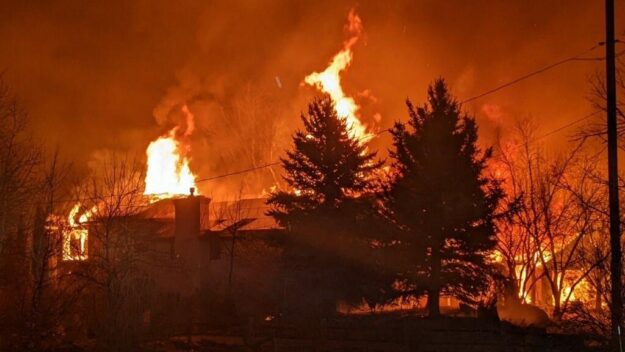Widgetized Section
Go to Admin » Appearance » Widgets » and move Gabfire Widget: Social into that MastheadOverlay zone
Opinion: Trump’s Energy Secretary Wright is a Denver ‘climate arsonist’

The Marshall Fire in Boulder in 2021 (first responder photo).
An address earlier this month by Energy Secretary Chris Wright at a gathering of fossil fuel industry heavyweights offered a detailed view of this key Trump administration official’s position on the climate crisis.
It was bleak.
Anyone who cares about maintaining a habitable planet for humanity must conclude after Wright’s remarks that administration policies jeopardize the well-being of future generations throughout the world. Officials like Wright, a Denver oil and gas business magnate, aren’t just hostile to climate solutions, they’re positively in favor of accelerating polluting activities.
And they’re wrong on the facts. The address, as well as previous statements by Wright, reveals the Cabinet member to be a source of misinformation at the highest levels of government.
He calls himself a “climate realist.” But, given that his version of reality could only lead to a scorched environment, he’s better described as a climate arsonist.

Wright has been a fossil fuel entrepreneur since the early 1990s. He founded the Denver-based fracking company Liberty Energy, which Forbes recently reported makes $4 billion a year in revenues. When he delivered keynote remarks March 10 during CERAWeek, an annual conference of corporate leaders, he stood before an audience of colleagues and friends.
“The Trump administration will treat climate change for what it is, a global physical phenomenon that is a side effect of building the modern world,” Wright said. “We have indeed raised global atmospheric CO2 concentration by 50% in the process of more than doubling human life expectancy … lifting almost all of the world’s citizens out of grinding poverty, launching modern medicine, telecommunications, planes, trains and automobiles too. Everything in life involves trade-offs.”
That was his main point: Yes, there’s climate change, and, yes, humans are causing it. But it’s totally worth it.
He pointed to the billions of people throughout the world, particularly in Africa, who lack the energy-dependent advantages that Americans enjoy, and, cloaking profit-making interests in a moral defense of air pollution, asserted that “they want what we have.”
But the glaring flaw in Wright’s reasoning is that his calculation of trade-offs omits the most consequential factor, as would be obvious to anyone who takes the scientific consensus on climate change seriously. Sure, carbon-based energy sources have made the modern world so far, but they also threaten to undo it. Less affluent nations might want inexpensive and reliable heating and cooling for their homes, but they don’t want extinction.
Wright’s whole pitch withers before the science. The latest comprehensive report from the U.N.’s Intergovernmental Panel on Climate Change highlights the urgency of immediate climate action.
“Climate change is a threat to human well-being and planetary health,” the report says. “There is a rapidly closing window of opportunity to secure a liveable and sustainable future for all.”
A 2023 State of the Climate report, authored by scientists from around the world and published in the peer-reviewed journal BioScience, said climate change is putting whole regions of Earth at risk of being uninhabitable.
“The effects of global warming are progressively more severe, and possibilities such as a worldwide societal breakdown are feasible and dangerously underexplored,” the report says. By the end of the century up to half the global population “might find themselves confined beyond the livable region.”
Some trade-off.
In his attempt to promote the virtues of fossil fuels, Wright is forced to downplay the promise of renewable energy. But his disdain for wind and solar sources is misleading. For example, in his CERAWeek remarks, he claimed that wind and solar supply only 3% of global energy. That’s much lower than figures cited in other sources. The climate think tank Ember estimated that wind and solar accounted for more than 13% of global electricity generation in 2023.
Scientific reports adhere to principles of transparency, verifiability and disinterest, but Wright’s perspective on its face lacks credibility, because his career in the fossil fuel industry is impossible to detangle from his advocacy for it. His net worth is estimated at $171 million. Might that fortune influence his judgment?
Wright has leveraged his wealth to influence environmental policy in Colorado. State records indicate that he has regularly donated money to Colorado Concern, a conservative alliance of business executives that has opposed state climate solution policies. In 2020, he gave $25,000 to the Colorado chapter of Americans for Prosperity, a Koch brothers-founded free-market advocacy group that fuels climate change denial.
2024 was the warmest year on record. The previous warmest year was 2023. In Colorado, 8 of the 10 warmest years in state history have occurred since 2012. A hotter, drier climate in Colorado has already contributed to crippling drought, stressed water resources and ferocious wildfires.
This is what Wright calls “a side effect,” and he is eager to promote policies that would cause more such devastation across the globe. His efforts to accelerate fossil fuel consumption is akin to setting the world on fire.
This opinion column first appeared on Colorado Newsline, which is part of States Newsroom, a nonprofit news network supported by grants and a coalition of donors as a 501c(3) public charity. Colorado Newsline maintains editorial independence. Contact Editor Quentin Young for questions: info@coloradonewsline.com.


